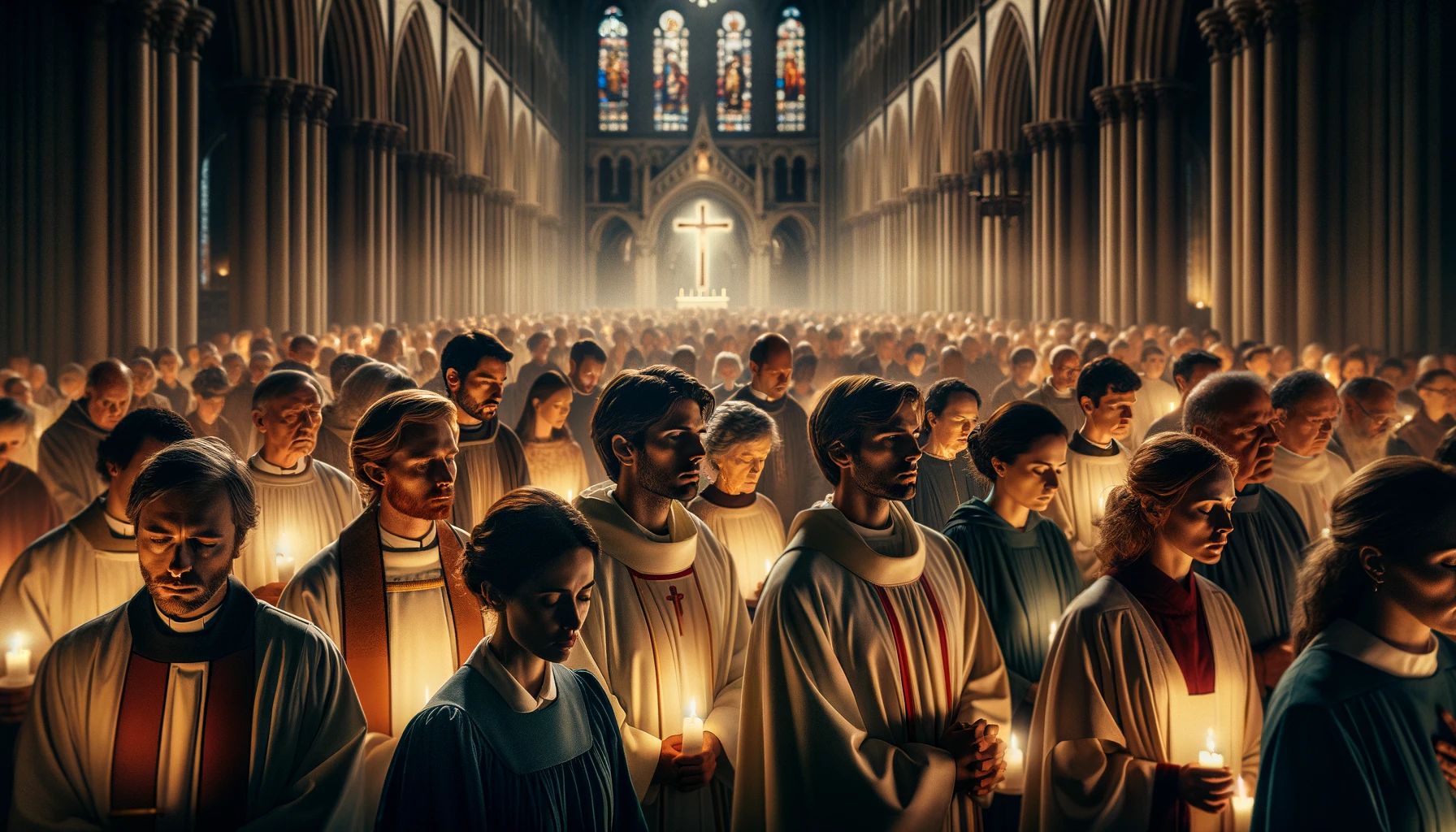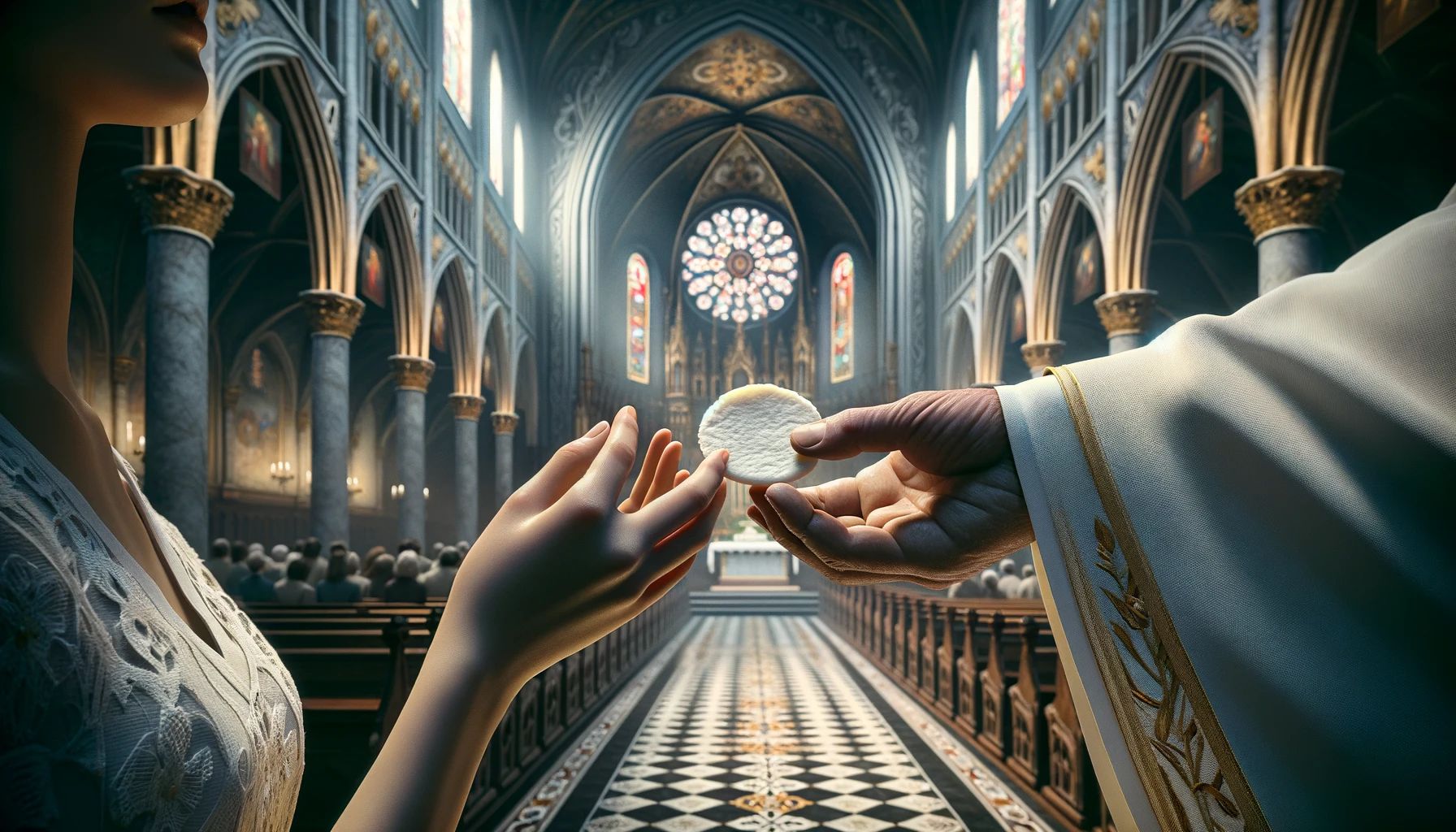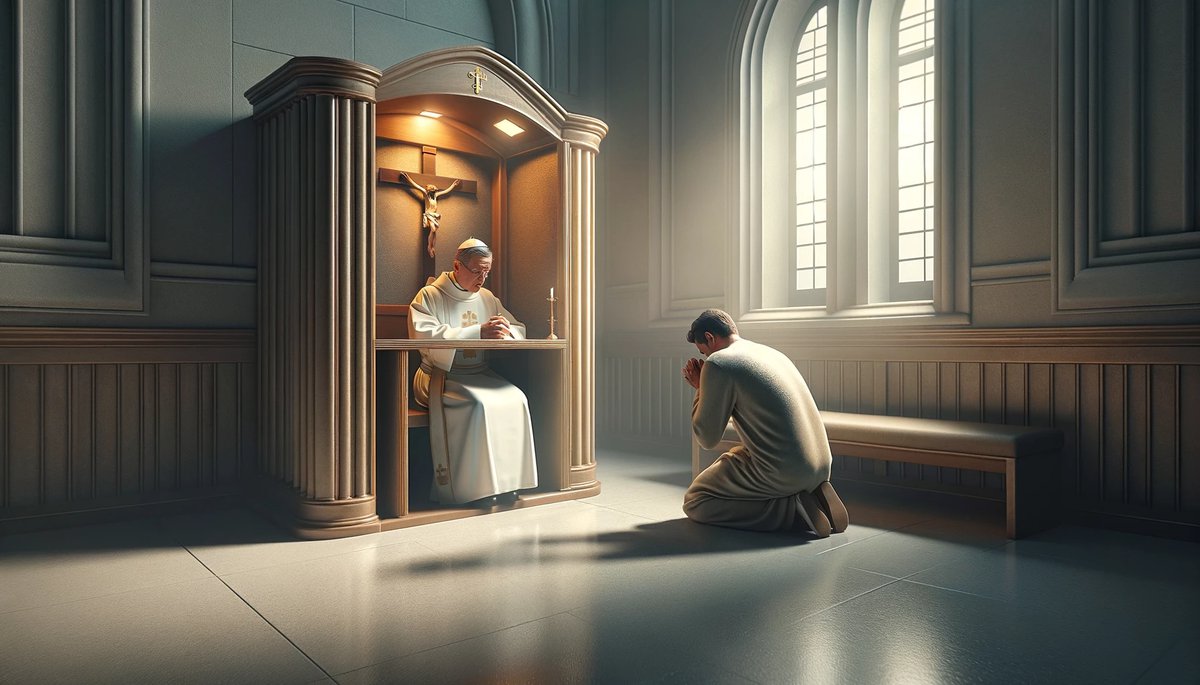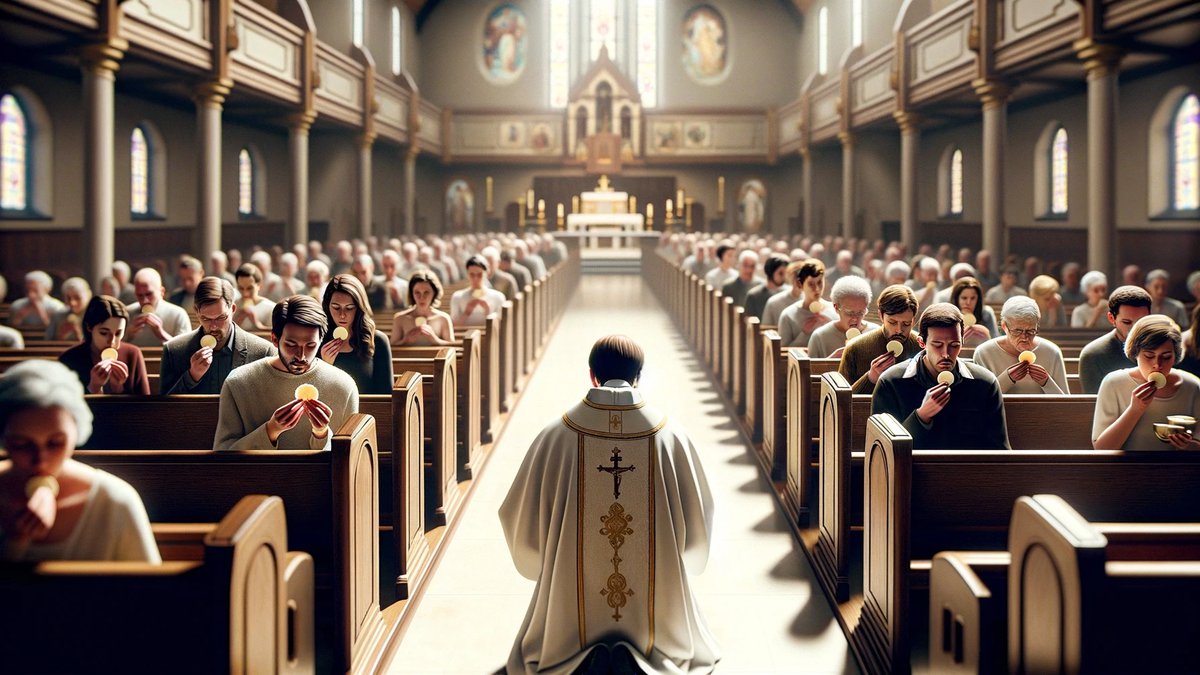Home>Theology and Spirituality>In The Catholic Religion, What Is Communion


Theology and Spirituality
In The Catholic Religion, What Is Communion
Published: February 25, 2024
Jason DeRose, Managing Editor at Christian.net, uses his expertise in religion and journalism to deepen understanding of faith's societal impacts. His editorial leadership, coupled with a strong academic background, enriches the platform’s diverse content, earning him recognition in both journalism and religious circles.
Discover the significance of Communion in the Catholic faith and its role in theology and spirituality. Explore the traditions and beliefs surrounding this sacred sacrament.
(Many of the links in this article redirect to a specific reviewed product. Your purchase of these products through affiliate links helps to generate commission for Christian.net, at no extra cost. Learn more)
Table of Contents
Introduction
Communion, also known as the Holy Eucharist, holds profound significance in the Catholic religion. It is a sacred ritual that symbolizes the spiritual nourishment and unity of believers with Christ and one another. The act of receiving communion is a central aspect of Catholic worship, steeped in rich symbolism and theological depth. Understanding the meaning, importance, process, and symbolism of communion in the Catholic faith is essential for both practitioners and those seeking to comprehend the traditions and beliefs of Catholicism. In this article, we will explore the multifaceted nature of communion in the Catholic religion, delving into its spiritual, theological, and communal dimensions. Through this exploration, we aim to shed light on the profound significance of communion in the Catholic faith and its integral role in the lives of believers.
The Meaning of Communion in the Catholic Religion
Communion, within the Catholic religion, encompasses a deeply spiritual and symbolic significance. At its core, communion represents the central sacrament of the Eucharist, where the faithful partake in the body and blood of Jesus Christ. This act of partaking in the Eucharist is rooted in the Last Supper, where Jesus shared bread and wine with his disciples, instructing them to continue this practice in remembrance of him.
In Catholic theology, communion is not merely a symbolic gesture but is believed to involve the real presence of Christ. This concept, known as transubstantiation, asserts that during the consecration of the Eucharistic elements by a priest, the substance of the bread and wine is transformed into the actual body and blood of Christ, while retaining the appearance of bread and wine. This profound belief underscores the intimate connection between the physical and the divine, as Catholics perceive the act of receiving communion as a direct encounter with the living Christ.
Furthermore, communion holds a communal dimension within the Catholic faith. It signifies the unity of believers as the body of Christ, emphasizing the interconnectedness and shared spiritual journey of the faithful. Through partaking in the Eucharist, Catholics express their solidarity with one another and their commitment to living out the teachings of Christ in their daily lives.
In essence, communion in the Catholic religion embodies a multifaceted symbolism, representing the spiritual nourishment derived from the body and blood of Christ, the real presence of Jesus in the Eucharistic elements, and the communal unity of believers as the body of Christ. This profound sacrament serves as a cornerstone of Catholic worship, encapsulating the essence of the faith and fostering a deep sense of spiritual connection and communal belonging among the faithful.
The Importance of Communion in the Catholic Faith
Communion holds immense significance in the Catholic faith, permeating the spiritual, communal, and doctrinal aspects of the religion. At the heart of its importance lies the belief in the real presence of Christ in the Eucharistic elements, signifying a profound encounter with the divine. This belief underscores the centrality of communion in Catholic worship, as it serves as a means of experiencing the living presence of Jesus Christ in a tangible and transformative manner.
Moreover, communion is deeply intertwined with the concept of spiritual nourishment within Catholicism. The act of partaking in the body and blood of Christ is viewed as a source of sustenance for the soul, providing spiritual strength, renewal, and sustenance for the journey of faith. It is through communion that Catholics seek to deepen their relationship with Christ, drawing closer to Him and finding solace in His abiding presence.
Furthermore, communion plays a pivotal role in fostering communal unity among believers. As Catholics come together to partake in the Eucharist, they affirm their shared identity as the body of Christ, bound by a common faith and purpose. This communal aspect of communion reinforces the interconnectedness of the faithful, emphasizing the importance of mutual support, fellowship, and collective worship within the Catholic community.
From a doctrinal perspective, communion is regarded as a sacrament of initiation, along with baptism and confirmation, marking an essential milestone in the spiritual journey of Catholics. It is through the reception of communion that individuals are fully incorporated into the mystical body of Christ, solidifying their commitment to the teachings and values of the Catholic faith.
Additionally, the significance of communion extends beyond the confines of the church, permeating the daily lives of Catholics. The spiritual nourishment derived from the Eucharist empowers believers to embody the love, compassion, and selflessness exemplified by Christ, inspiring them to live out their faith in the world and serve as instruments of God's grace and mercy.
In essence, the importance of communion in the Catholic faith is multifaceted, encompassing its role as a profound encounter with the real presence of Christ, a source of spiritual nourishment, a symbol of communal unity, a sacrament of initiation, and a catalyst for living out the teachings of Christ in everyday life. As such, communion stands as a cornerstone of Catholic belief and practice, shaping the spiritual identity and communal bonds of the faithful.
The Process of Receiving Communion in the Catholic Church
The process of receiving communion in the Catholic Church is a sacred and reverent ritual that holds deep spiritual significance for believers. It is a central aspect of the Catholic worship experience, marked by a prescribed set of procedures and gestures that reflect the solemnity and sanctity of the Eucharistic celebration.
The process begins with the preparation of the Eucharistic elements, typically unleavened bread and wine, which are consecrated during the Mass. Prior to receiving communion, Catholics participate in the Liturgy of the Eucharist, a sacred rite that includes the offering of prayers, the consecration of the bread and wine, and the recitation of the Lord's Prayer. This part of the Mass culminates in the distribution of communion to the faithful.
As the moment of communion approaches, worshippers approach the altar in a reverent manner, often forming orderly lines to receive the Eucharist. Before receiving communion, it is customary for Catholics to make a gesture of reverence, such as genuflecting or bowing, as a sign of respect for the real presence of Christ in the consecrated elements. This act of reverence acknowledges the sacred nature of the Eucharist and reflects the deep reverence that Catholics hold for the body and blood of Christ.
When it is their turn, individuals receive the consecrated host, which is the body of Christ, on their outstretched hands or directly on their tongue, depending on local customs and personal preference. The communicant responds "Amen" after receiving the host, affirming their belief in the real presence of Christ in the Eucharist. In the case of receiving the consecrated wine, worshippers may drink from the chalice or, in some instances, intinction, where the consecrated host is dipped into the chalice before consumption.
Following the reception of communion, worshippers return to their seats in a spirit of prayer and contemplation, reflecting on the profound encounter with Christ that has taken place. The process of receiving communion is not merely a physical act but a deeply spiritual experience, as Catholics believe that they are communing with the living Christ and receiving His grace and blessing.
In essence, the process of receiving communion in the Catholic Church is characterized by reverence, solemnity, and a profound sense of spiritual connection. It is a sacred moment that encapsulates the central tenets of the Catholic faith, serving as a tangible expression of the real presence of Christ and the communal unity of believers.
The Symbolism of Communion in the Catholic Religion
The symbolism of communion in the Catholic religion encompasses a rich tapestry of spiritual, theological, and communal significance. At its core, communion serves as a profound symbol of unity, nourishment, and divine presence within the Catholic faith.
One of the central symbols of communion is the concept of spiritual nourishment. In partaking of the Eucharist, Catholics symbolically receive the body and blood of Christ, signifying the sustenance and renewal of their spiritual lives. This act of partaking in the Eucharistic elements represents a deep spiritual feeding, wherein believers are nourished by the grace and presence of Christ, strengthening their faith and fortifying their souls for the journey of discipleship.
Furthermore, communion symbolizes the unity of believers as the body of Christ. Through the act of partaking in the Eucharist, Catholics express their interconnectedness and shared identity as members of the mystical body of Christ. This symbol of communal unity underscores the bond of fellowship and mutual support among believers, emphasizing their collective participation in the life and teachings of Jesus Christ.
The symbolism of communion also extends to the concept of sacrifice and redemption. In Catholic theology, the Eucharist is intricately linked to the sacrificial offering of Christ on the cross, wherein His body was broken and His blood was shed for the salvation of humanity. Through the symbolic reenactment of this sacrificial act during the Eucharistic celebration, communion serves as a poignant reminder of Christ's redemptive love and the transformative power of His sacrifice, inviting believers to partake in the fruits of His saving grace.
Moreover, communion symbolizes the real presence of Christ in the Eucharistic elements. The belief in transubstantiation underscores the profound symbolism of communion, as Catholics perceive the consecrated bread and wine not as mere symbols but as the actual body and blood of Christ. This symbolic representation of the real presence of Jesus in the Eucharist serves as a tangible expression of His abiding love and intimate communion with the faithful.
In essence, the symbolism of communion in the Catholic religion encompasses a multifaceted representation of spiritual nourishment, communal unity, sacrificial redemption, and the real presence of Christ. This rich symbolism underscores the profound depth and significance of the Eucharistic celebration, serving as a central pillar of Catholic faith and practice.
The Role of Communion in Catholic Worship Services
The role of communion in Catholic worship services is central to the liturgical and spiritual life of the Church. Communion, also known as the Holy Eucharist, holds profound significance as the pinnacle of the Catholic Mass, the primary form of worship for Catholics. At the heart of the Eucharistic celebration lies the reception of the body and blood of Christ, a sacred act that embodies the real presence of Jesus in the consecrated elements of bread and wine.
During the Catholic Mass, the Liturgy of the Eucharist constitutes the culminating and most revered part of the service. This sacred rite involves the consecration of the bread and wine by the priest, transforming them into the body and blood of Christ through the theological concept of transubstantiation. The faithful are then invited to partake in the Eucharist, receiving the consecrated host and, in some cases, the consecrated wine.
The role of communion in Catholic worship services extends beyond a symbolic reenactment of the Last Supper; it is a profound encounter with the living Christ. Through the reception of the Eucharist, Catholics believe they enter into a direct communion with Jesus, experiencing His grace, love, and transformative presence. This spiritual encounter serves to nourish and strengthen the faith of the communicants, fostering a deep sense of spiritual renewal and communion with the divine.
Furthermore, communion in Catholic worship services serves as a visible expression of the communal unity and solidarity of believers. As the faithful come forward to receive the Eucharist, they bear witness to their shared identity as the body of Christ, united in faith and purpose. This communal aspect of communion underscores the interconnectedness of the faithful and reinforces the bonds of fellowship and mutual support within the Catholic community.
The role of communion in Catholic worship services also extends to its function as a sacrament of initiation and spiritual nourishment. Through the reception of the Eucharist, Catholics are initiated into the fullness of the Church, marking a significant milestone in their spiritual journey. The act of partaking in the body and blood of Christ symbolizes the nourishment of the soul, providing spiritual sustenance and fortitude for the challenges of daily life.
In essence, the role of communion in Catholic worship services is multifaceted, encompassing its function as a sacred encounter with the real presence of Christ, a symbol of communal unity, a sacrament of initiation, and a source of spiritual nourishment. As the pinnacle of the Catholic Mass, communion stands as a profound expression of faith, unity, and spiritual communion with the living Christ, shaping the worship experience and spiritual identity of the faithful.
Conclusion
In conclusion, communion holds a central and profound place within the Catholic religion, embodying a rich tapestry of spiritual, theological, and communal significance. The act of partaking in the body and blood of Christ through the Eucharist represents a sacred encounter with the living presence of Jesus, symbolizing the spiritual nourishment, communal unity, and redemptive love at the heart of the Catholic faith.
The meaning of communion in the Catholic religion extends beyond a mere symbolic gesture; it encapsulates the belief in the real presence of Christ in the Eucharistic elements, emphasizing the intimate connection between the physical and the divine. This profound sacrament serves as a tangible expression of the spiritual nourishment derived from the body and blood of Christ, fostering a deep sense of communion with the living Christ and the communal unity of believers as the body of Christ.
Furthermore, the importance of communion in the Catholic faith is multifaceted, permeating the spiritual, communal, and doctrinal dimensions of the religion. It serves as a source of spiritual nourishment, a symbol of communal unity, a sacrament of initiation, and a catalyst for living out the teachings of Christ in everyday life. The significance of communion extends beyond the confines of the church, permeating the daily lives of Catholics, empowering them to embody the love, compassion, and selflessness exemplified by Christ.
The process of receiving communion in the Catholic Church is characterized by reverence, solemnity, and a profound sense of spiritual connection. It is a sacred moment that encapsulates the central tenets of the Catholic faith, serving as a tangible expression of the real presence of Christ and the communal unity of believers.
The symbolism of communion in the Catholic religion encompasses a multifaceted representation of spiritual nourishment, communal unity, sacrificial redemption, and the real presence of Christ. This rich symbolism underscores the profound depth and significance of the Eucharistic celebration, serving as a central pillar of Catholic faith and practice.
In Catholic worship services, communion stands as the pinnacle of the Mass, embodying the real presence of Christ and serving as a profound expression of faith, unity, and spiritual communion with the living Christ. It plays a pivotal role in fostering communal unity, providing spiritual nourishment, and marking a significant milestone in the spiritual journey of believers.
In essence, communion in the Catholic religion is a sacred and transformative sacrament that encapsulates the essence of the faith, fostering a deep sense of spiritual connection, communal belonging, and transformative encounter with the living Christ. It stands as a cornerstone of Catholic belief and practice, shaping the spiritual identity and communal bonds of the faithful.














